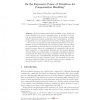Free Online Productivity Tools
i2Speak
i2Symbol
i2OCR
iTex2Img
iWeb2Print
iWeb2Shot
i2Type
iPdf2Split
iPdf2Merge
i2Bopomofo
i2Arabic
i2Style
i2Image
i2PDF
iLatex2Rtf
Sci2ools
ESOP
2010
Springer
2010
Springer
On the Expressive Power of Primitives for Compensation Handling
Modern software systems have frequently to face unexpected events, reacting so to reach a consistent state. In the field of concurrent and mobile systems (e.g., for web services) the problem is usually tackled using long running transactions and compensations: activities programmed to recover partial executions of long running transactions. We compare the expressive power of different approaches to the specification of those compensations. We consider (i) static recovery, where the compensation is statically defined together with the transaction, (ii) parallel recovery, where the compensation is dynamically built as parallel composition of compensation elements and (iii) general dynamic recovery, where more refined ways of composing compensation elements are provided. We define an encoding of parallel recovery into static recovery enjoying nice compositionality properties, showing that the two approaches have the same expressive power. We also show that no such encoding of genera...
ESOP 2010 | General Dynamic Recovery | Long Running Transactions | Programming Languages | Static Recovery |
| Added | 09 Jul 2010 |
| Updated | 09 Jul 2010 |
| Type | Conference |
| Year | 2010 |
| Where | ESOP |
| Authors | Ivan Lanese, Cátia Vaz, Carla Ferreira |
Comments (0)

